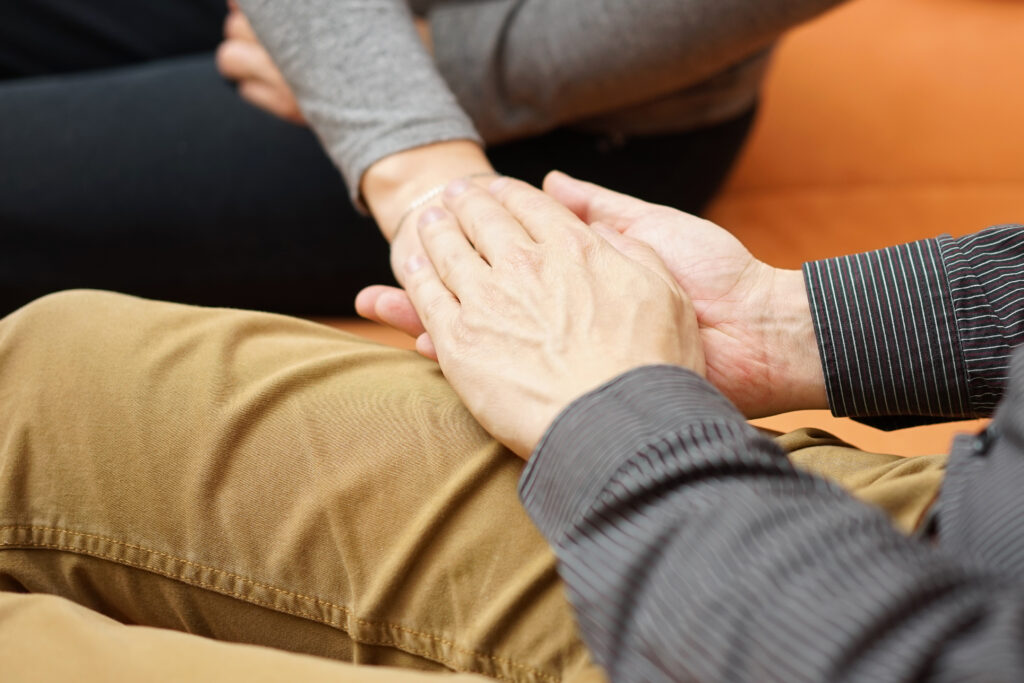What is MND
Find support
I have MND
I am supporting someone
Get involved
Research
About MND Scotland

“I usually have the alarm set for 7:40am, so that I can make sure that Kate is awake and ready for the carers’ arrival. I make her a cup of tea, remove her breathing mask and equipment, sit her up straight in bed, open the curtains and find out how her night was. I can check the CPAP breathing machine to see how long she managed with the face mask. Anything less than four hours indicates a problem.
Since Kate’s diagnosis, I’ve had to stop working so that I can be here for her, and doing this is my priority. I help her with going to the toilet and emptying her catheter bag (this needs to be done every 2-3 hours). Initially, I would also get her dressed and washed, but moving and getting her dressed became increasingly difficult, especially as one person. We were provided with carers in the morning quite early on after the diagnosis which made an enormous difference. I’m very grateful to have them. But they don’t always understand MND. Kate sometimes finds it very painful when they get her ready. They’ve asked her whether she would take Oramorph in the morning before they arrive.
When they are getting her dressed, I tend to make breakfast for us both. Kate still works 5 days a week in policy, so she needs to be at her desk for 10. Even while she is working, medical professionals come in and out which I oversee, or I might spend time cleaning and maintaining all the equipment we have. I might take her to the toilet, if she didn’t go first thing, and I empty her catheter bag again. I monitor her liquid intake as well so that she keeps hydrated.
I then make lunch and as Kate’s strength and grip in her hands has become worse, I’ve started to help her with eating. She gets very tired, and so depending on what is going on, she might have an afternoon nap. I spend time doing things behind the scenes – arranging appointments, sorting out nutrition and personal care ‘stock’ – making sure we have enough catheter bags, nutritional formula, and so on. We live in a remote area, so if I don’t keep an eye on it, it’s easy to get caught out and get stuck.
We have a few hours of respite a week, which has been much needed and incredibly helpful. It gives me time to do things I need to do, like shopping and cooking. Occasionally, I might go out on my bike.
Kate and I have 4 children and 6 grandchildren. If they come to visit or to stay, or we have any visitors, I am responsible for managing visits, and judging whether Kate needs a rest, or what else I might need to do. I make dinner, tidy up, change the catheter bag again, take her to the toilet. We might spend some time together in the evening listening to music.
I then get her ready for bed, which is easier than getting dressed. We’ve been assessed as urgently needing carers, but we simply can’t get them as they are so short staffed here, though we are currently working with MND Scotland’s advocacy team. I get her ready and into bed. Once she’s in bed, she can’t move, so I try my best to get her into the most comfortable position. She gets very sore if her body is twisted in anyway. We have a sleep system in place which requires me to place’s blocks around her so that she is supported, however these need to be positioned and cushioned for comfort. I make sure the respiratory mask is properly adjusted and in place with the machine in easy reach of her hand. Kate also needs her water tube to hand and the bed controls so there is a lot to put in place. She also has an alarm button. She might call me in to help her move in the night, or if she needs the toilet. Sometimes she panics and I need to calm her down. Once I am satisfied that she is comfortable, I then leave her and go to our bed upstairs. I know that I’ll be needing to do more night-time care at some point. I’m not sure how soon. That’s the challenging thing with MND – as soon as you get used to something it changes. And it is this constant, incremental, relentless deterioration that makes caring for a loved one with this disease so hard.”
Sign up
for newsletter
Get the latest news and events straight to your inbox
You can help create a world without MND